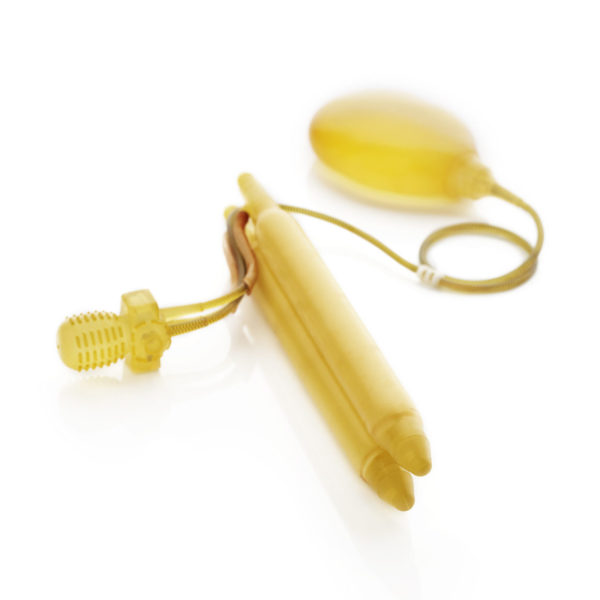
How Long to Wait for Sex After Circumcision
Many parents decide to circumcise their baby boys for various reasons. It could be due to religion. Maybe they do it because circumcision removes the extra foreskin, making the penis easier to clean. Some parents go forward with the procedure because a circumcised penis simply looks better.
Most circumcisions happen shortly at birth. However, there are situations in which teens or adults may decide to get circumcised. They primarily do it for health reasons. An uncut penis can develop serious medical issues such as:
- Phimosis. This is when the foreskin becomes so tight that it cannot retract.
- Paraphimosis. This is when the foreskin gets caught behind the penis and cannot retract.
- Balanitis. This refers to inflammation of the head of the penis.
- Balanoposthitis. This refers to inflammation of the foreskin and glans.
These diseases can be painful and embarrassing for men. That’s why many choose to get circumcised as they get older.
But once a male gets circumcised, they may wonder: when can I have sex again? Obviously, this is not a concern for babies who are circumcised, but in the teen and adult years, sex becomes very important. At the very least, the boy or man may engage in masturbation, so how long do they have to wait to resume their sex lives after circumcision?
How Long Should I Wait?
For the most part, you should wait at least four weeks before resuming sex after circumcision. Six weeks is optimal. This allows your penis to fully heal so you don’t develop any complications. Having sex before the four-week period puts added strain on the wound and if you have stitches, they could pop open, delaying the healing process. You should avoid getting an erection at all if possible, so refrain from both sex and masturbation during the healing process. Even if four weeks have passed, you should not have sex if you still have stitches or open wounds. Your doctor can advise you if you have concerns.
Why You Need to Wait
You may be raring to get back to your bedroom activities after just a few days. You may feel good and ready to perform, but you shouldn’t. Even if you think you are fully healed by this time, chances are, you’re not. Having sex or masturbating is not a good idea and could cause complications such as:
- Unusual discharge from the penis
- Swelling of the penis
- Bleeding from the wound
- Pain while urinating
- Intense pain and cramps in the lower abdomen
- Erectile dysfunction
Contact Us Today
Circumcisions can be done at any age, but as a person gets older, they become more complicated. This is especially true when it comes to sexual activity. If you are considering circumcision, contact a New York doctor from Lazare Urology. We’ll guide you through the process and inform you of the risks and benefits. To schedule a consultation, fill out the online form or call (718) 568-7516. We serve the Brooklyn area.

How Long is Recovery from a Vasectomy Reversal?
The decision to have children or not have them is one that should be taken seriously. But sometimes people change their minds. They may think they don’t want any kids, only to meet a special someone who does want them.
It’s difficult and even impossible to reverse a tubal ligation for women. However, many men can successfully reverse their vasectomy and become fertile again. Vasectomy reversal takes a couple of hours and requires two weeks of full recovery as long as everything goes well.
When it comes to vasectomy reversal, the recovery process is the same as having a vasectomy itself. There are several main rules that apply:
- Rest and apply ice to the area to reduce swelling in the first few days.
- You can resume moderate physical activity within one week.
- You can resume sexual activity, including ejaculation, within two weeks.
Read on to find out what else you should know about recovering from a vasectomy reversal.
Caring for Yourself After a Vasectomy Reversal
Recovery from a vasectomy reversal takes 1-2 weeks, although each person is different. By following your doctor’s instructions, you can heal faster.
- You may have bruising, swelling, and pain in your groin and scrotum area. This will usually go away within a week or two.
- Take care of your incision by gently washing it with warm, soapy water and pat it dry afterward. Strips of tape should stay on for a week or until they fall off.
- Get plenty of rest. Adequate sleep will aid in recovery. However, you should also walk every day to help keep the blood flowing, which prevents constipation and pneumonia. You should avoid heavy lifting and strenuous activities.
- Showering is OK, but you should avoid bathing until your affected area has healed (roughly a week or so). Keep the area as clean and dry as possible to help prevent infections.
- Take medications as directed. If you are given antibiotics, take the entire course, even if you feel better.
You may wonder when you can return to work. This will depend on how physical your job is. For the most part, you should be able to return to work or school within a week. However, if your job is physically demanding, you should consider taking two weeks off. Sometimes complications occur, making the recovery process longer. For example, you may have to deal with ripped stitches, infection, or increased pain. Contact your Brooklyn, New York doctor with any concerns. If you have follow-up appointments, make sure to keep them.
Contact Us Today
You may not have wanted kids when you were younger, but you got married and changed your mind. If you already had a vasectomy, the good news is that reversing it is a straightforward process. Contact a New York doctor at Lazare Urology to schedule a vasectomy reversal. We use local or general anesthesia and have a 90% success rate. To learn more, fill out the online form or call (718) 568-7516. We serve the Brooklyn area.

How to Prevent Erectile Dysfunction
Struggling to maintain an erection? You’re not alone. Erectile dysfunction is a common medical issue that affects 30 million men in the United States. While older men are more likely to experience erectile dysfunction, it can affect men of any age.
If your bedroom performance is becoming lackluster, though, you don’t have to sit and suffer in silence. It’s a good idea to discuss the situation with your doctor. You may feel embarrassed to do so, but with the right medical help, you can lessen the effects of erectile dysfunction and enjoy sex with your partner for many more years.
The good news is that you want to stave off the effects of erectile dysfunction, there are things you can do now. Here are some tips on how you can prevent erectile dysfunction.
Lose Weight
Keep your weight low to prevent high blood pressure and diabetes, which can cause erectile dysfunction. Plus, excess fat can cause other medical conditions that can also affect your ability to get and maintain an erection. In addition, losing weight can help reduce inflammation and increase testosterone levels
Eat a Healthy Diet
Avoid fatty foods and sodium and opt for whole-grain foods, fruits and vegetables, and lean meats instead. A healthy eating plan will help you control your weight. Drinking too much alcohol can also lead to erectile dysfunction, so find ways to cut back. Doing these things will help control your blood pressure and prevent diabetes, which can reduce the risk of erectile dysfunction.
Improve Your Vascular Health
Your vascular health involves your heart, brain, and penis. It relates to medical issues that can cause erectile dysfunction, such as:
- High blood pressure
- High blood sugar
- High cholesterol
- High triglycerides
These issues can cause heart attack, stroke, and erectile dysfunction, so work with your doctor to keep these numbers low.
Get Moving
Exercise helps with blood flow to all parts of the body, including the penis. But you don’t have to go out and get a gym membership to see results. Start by engaging in low-impact exercises, such as walking or swimming, Aim for 30 minutes of activity at least five days a week. Just walking most days can help you see a huge dip in issues related to erectile dysfunction.
Quit Smoking
Smoking increases your chances of getting erectile dysfunction, as it affects the heart and blood vessels. When blood cannot get to the penis, it’s harder to get an erection. So if you smoke, quit now and reduce your risk of erection problems.
Contact Us Today
No man wants to deal with erectile dysfunction. Not being able to maintain an erection is a physical and emotional blow that can negatively impact relationships and well as a man’s overall self-esteem.
A New York doctor from Lazare Urology can help you maintain your sexual health so you can enjoy sex for years to come. If erectile dysfunction is an issue, we have options that can help. Schedule an appointment with our office today by calling (718) 568-7516 or filling out the online form. We serve the Brooklyn area.

Why Circumcision is Better
Circumcision is a common practice in the United States in which the foreskin is surgically removed. The foreskin is the skin that covers the tip of the penis. In the past, circumcision was pretty much the go-to procedure for baby boys in the United States. Nowadays, there is concern about the procedure. Many parents have strong opinion against it, even going so far as to call it “genital mutilation.” While circumcision does require the removal of some foreskin, it does not mutilate the penis. Circumcision is often done for religious, medical, or cosmetic reasons. It is particularly common in the Jewish and Christian religions. So is being circumcised better than not being circumcised? Many medical experts tend to think so, claiming that the benefits outweigh the risks. So what exactly are these benefits? If you are considering circumcision for your child, here’s what you need to know.
Benefits of Circumcision
Circumcision offers the following advantages:
- Better hygiene. A penis is easier to clean when there is no foreskin covering it. If boys are not caught to clean their penis, they can develop bacteria and fungus, which can lead to infections.
- Medical reasons. Uncircumcised males may develop issues with their foreskin, such as balanitis (inflammation of the foreskin), phimosis (failure of the foreskin to retract), balanoposthitis (swelling of the penis’ foreskin and tip), and paraphimosis (failure of a retracted foreskin to get back to the normal position). These conditions can be managed with circumcision.
- Decreased risk of urinary tract infections. Men who are uncircumcised are more likely to develop urinary tract infections, which can lead to kidney problems later on.
- Decreased risk of sexually transmitted diseases. Circumcised men tend to have a lower risk of developing and spreading HIV and sexually transmitted diseases. That’s why there has been a mass circumcision campaign in Africa.
- Decreased risk of penile cancer. Cancer of the penis is less common in circumcised men.
- Better sex. There is the possibility that circumcision may make sex better for men. Studies show that the majority of circumcised men experience greater sensitivity and an increased ability to achieve orgasm. However, this may be debatable, as many uncircumcised men claim they have more nerve endings and therefore more sensitivity.
- Women tend to prefer it. Most studies showed that women in the United States had a preference for sexual activity with men who were circumcised. Their reasons were better appearance, better hygiene, and less risk of infection.
Contact Us Today
While circumcision is a heavily debated procedure that is not usually medically necessary, it does come with many benefits. Weigh the pros and cons with your doctor to determine if it’s right for you or your son. Learn more about circumcision by scheduling a consultation with a New York doctor from Lazare Urology. We have the experience to perform safe and effective circumcisions. Call (718) 568-7516 or fill out the online form to schedule an appointment today. We serve the Brooklyn area.

Vasectomy Pros vs. Cons
With Roe v. Wade being overturned, women’s right to abortions have been affected. Men are stepping up to the plate when it comes to birth control and this has led to a huge increase in vasectomies. In fact, some doctors have seen a 400% increase in vasectomy requests. A vasectomy is a highly effective form of birth control that works by preventing sperm from entering the vas deferens, which is the tube that extends from the testicles to the penis. The sperm cannot reach the penis, which makes it so pregnancy does not occur.
Most men who have had a vasectomy have no regrets. They enjoy the freedom that comes with being able to have sex whenever they want and not have to worry about the possibility of pregnancy. However, a vasectomy is still a surgical procedure, and while it may be a relatively easy one, it still comes with pros and cons that you should know about.
Pros of Vasectomies
A vasectomy is beneficial in many ways:
- It’s effective. Vasectomies have a 99% effective rate, making them one of the most effective forms of birth control.
- It’s easy. Vasectomies are much easier to perform than tubal ligations. They take less than 30 minutes (sometimes even less than 10 minutes) and do not require general anesthesia.
- They’re cost effective. Vasectomies are much cheaper than tubal ligations. They’re also a lot cheaper than raising a child. In many cases, your insurance may cover the entire cost.
- Your sex drive won’t be affected. Many men worry that their sex life won’t be the same, but your sex drive, erections, and testosterone levels won’t be affected at all. In fact, some men feel as though their sex life is better after a vasectomy because they no longer have to worry about pregnancy, which makes them feel more relaxed.
Cons of Vasectomies
Vasectomies do have some downsides, though, such as the following:
- They’re not effective right away. Unlike a tubal ligation, which works right away, a vasectomy takes some time because sperm may still be in the semen. It may take about 20 ejaculations to get rid of all this sperm. Have your doctor check your sperm levels several months after the procedure. Until then, use birth control.
- Side effects. In some cases, men experience bleeding, swelling, and pain after a vasectomy. If it doesn’t go away after a few days, contact your doctor.
- No protections against STDs. You will still need to use a condom if you’re concerned about sexually transmitted diseases.
Contact Us Today
Vasectomies are easy surgeries but they are life-changing procedures. As such, complications can still occur. Make sure to review the pros and cons with your doctor to make sure this procedure is right for you. A New York doctor from Lazare Urology can address your concerns and help you prepare for a vasectomy. Schedule an appointment with our office by calling (718) 568-7516 or filling out the online form. We serve the Brooklyn area.
How Many Nerve Endings Are Lost in Circumcision?
To circumcise or not to circumcise? That is a question that many parents are asking nowadays when they have male children. Circumcision has many benefits. It can help reduce the risk of cancer and other diseases. Plus, a circumcised penis is better for hygiene, as it is easier to clean.
There are many people, though, who are vehemently against circumcision. They claim it is akin to genital mutilation, robbing a male of sensitivity in his penis. In fact, many anti-circumcision groups will claim that foreskin contains more than 20,000 nerve endings. Circumcised men are allegedly being deprived of 75% of sexual pleasure, as these thousands of nerve endings provide most of the pleasure that a man experiences during sexual activity.
However, the source of this information is unknown. No study has effectively shown that circumcision results in the removal of so many nerve endings.
The reality for many men is that sex is even better after circumcision
The head of the penis has more than 4,000 nerve endings on its own. This is an incredibly sensitive area of a man’s body. And while many people will argue that the foreskin has even more nerve endings and removing it will reduce pleasurable sensations during intercourse, studies have shown just the opposite.
In a study of men who underwent circumcision, 64% of them reported their penis was “much more sensitive.” In addition, 55% of them found that reaching orgasm was much easier after their circumcision. This is likely because those 4,000 nerve endings are found in the head of the penis, not the foreskin. Removing the foreskin exposes the sensitive head of the penis, allowing for an increase in sexual pleasure.
In a study of African men, 4,456 were uncircumcised, with 2,210 of those men getting circumcised. The men were surveyed before and after the procedure and showed the following:
- The men saw no differences in sexual desire, erection issues, or ejaculation issues.
- Two years after the circumcision, 98.4% of the men felt “satisfied or very satisfied” with their sex lives.
- 72% of the men said their sensitivity had increased after circumcision
- 78% of the men said circumcision made it easier to put on condoms.
What this means is that despite what some groups will say, circumcision does not impair sexual activity, function, and pleasure at all and in many cases, may even mave sex more enjoyable.
Contact Us Today
It’s hard to tell just how many nerve endings are lost in circumcision, if any. Overall, it is not believed that circumcision negatively impacts a man’s sex life. It may even increase sensitivity and make sex better in other ways.
If you have concerns about circumcision, contact a New York doctor from Lazare Urology. We can answer your questions and help you better understand the pros and cons of such a procedure. Schedule an appointment with our office today. Call (718) 568-7516 or fill out the online form. We serve the Brooklyn area.

Psychological Erectile Dysfunction
Many men wish to have sex but struggle to do so. They may suffer from performance issues that affect their ability to get and maintain an erection. This is called erectile dysfunction and many men may think they are experiencing this due to age or medical problems. But it’s possible that it could just be in their head — literally.
Men of all ages could develop psychological erectile dysfunction. This type of sex problem develops due to stress, anxiety, and other factors that are not necessarily medical in nature. While psychological erectile dysfunction can be treated, it can be difficult. Treatment will often focus on both the mind and the body.
What Causes Erectile Dysfunction?
Erectile dysfunction can have psychological causes, such as the following:
- Performance anxiety. A man may be anxious about whether or not he can adequately perform in the bedroom, and this can make matters worse, making it harder to get an erection.
- Stress. When a person is stressed out, it becomes more difficult to get aroused.
- Depression. Depression makes it hard for people to be interested in activities such as sex.
- Relationship issues. When a couple is experiencing conflict, this causes stress, which can make it harder for a man to get into the mood and maintain an erection.
- Low self-esteem. Past performance issues may make a man experience low self-esteem, which can affect future sexual relations.
- Trauma. A man who has been a victim of sexual abuse in the past may have trauma associated with that experience and it can affect his sex life.
Diagnosis and Treatment
When diagnosing erectile dysfunction, doctors will perform various tests to rule out any medical conditions. Blood and urine tests can look for heart problems, diabetes, anemia, and testosterone problems, all which can cause erectile dysfunction. A nocturnal penile tumescence test can also measure erectile function while the man is sleeping.
If there are no medical issues, the next step is to look for psychological issues. If stress, anxiety, or psychological disorders are causing erectile dysfunction, then it can be treated through psychotherapy, which helps patients understand their thoughts and feelings about sexual activity. Couples counseling can be helpful for both parties, especially since women can feel like they are to blame for their partner’s erectile dysfunction.
Meditation, breathing strategies, and other relaxation techniques can help a man feel more calm. Antidepressants and anti-anxiety medication can help with feelings of stress and anxiety.
Contact Us Today
Erectile dysfunction can have many causes. When it is psychological in nature, treatment will focus on therapy and counseling to help the man understand why he feels the way he does so he can control his thoughts.
The good news is that there are many treatment options for erectile dysfunction. Learn more by contacting a New York doctor from Lazare Urology. We can assess your situation and help you understand your options. Schedule an appointment today by filling out the online form or calling (718) 568-7516. We serve the Brooklyn area.

Penile Implant Infection Symptoms
A healthy sex life is important to many men. However, many suffer from erectile dysfunction, which makes it difficult to get and maintain an erection.
Many men take pills such as Viagra to achieve an erection. Others opt for regular testosterone shots. These options work well for many men, but some still struggle with their sex lives.
For men looking for a more permanent option to treat their erectile dysfunction, there is something called a penile implant. A penile implant may seem odd to some men, but those who have one enjoy the fact that they can get an erection on demand — in as little as 15 seconds — by using a pump. The satisfaction rate is as high as 95%, so it’s a very effective option.
While penile implants last a long time — typically 10-15 years — there is a risk of infection after the surgery. The rate is very low, at just 1%, because of the special surgical techniques and antibiotics used.
Still, you should know what to expect in case an infection happens to you. Most infections happen within the first year. Fifty-sex percent happen within seven months of the implant surgery, while another 36% happen between months 7 and 12. Less than 3% happen after five years.
Signs of Infection
Here are some signs that you may have a penile implant infection:
- Significant pain at the surgery site
- Red, swollen, tender, and hot skin
- Pus draining from the incision
- Hematoma or abscess around the implant area
- Fever
- Prolonged fixation of the pump to the scrotal wall
As the surgery is on a sensitive area of the body, you can expect that there may be moderate pain for several weeks following the operation. Therefore, pain alone is not a sign of infection. Typically, one or more of the other signs must be present.
It is possible for the implant to erode due to infection. In any case, if infection is present, the implant and all foreign material should be removed. When the implant is removed, the body will clear the infection using its defense mechanisms.
Many doctors may consider using oral antibiotics in an attempt to sterilize the area, but this is often impossible. Placing irrigation drains around the wound may be helpful in eliminating all traces of the infection. A new implant can then be inserted after healing —two months or so.
Contact Us Today
A penile implant may be the best way to get your sex life back if pills and shots aren’t working. However, there are risks involved, such as infection, so make sure you know the signs.
Have questions or concerns? A New York doctor from Lazare Urology can help you understand what to expect so you can make an informed decision as to whether or not a penile implant is right for you. Call (718) 568-7516 or fill out the online form to schedule a consultation. We serve the Brooklyn area.
Drugs That Cause Erectile Dysfunction
While many men have a normal sex life, many struggle with erectile dysfunction. Millions of men in the United States alone suffer from some degree of erectile dysfunction, which refers to difficulty in achieving and maintaining an erection.
It’s a frustrating and embarrassing problem for men. Unfortunately, many cases of erectile dysfunction are caused by medications.
It’s important to understand that not every man is affected in the same way, but there are a variety of drugs that can affect sexual performance. Recreational drugs such as alcohol, tobacco, marijuana, cocaine, heroin, and amphetamines can affect blood flow to the penis. There are many prescription drugs that have this effect as well.
Medications to Be Aware Of
Antidepressants and other psychiatric medications are the biggest offenders. These medications often affect sex drive, even for women. Some common antidepressants that men should be aware of include:
- Valium
- Prozac
- Zoloft
- Librium
- Elavil
- Ativan
- Marplan
- Serentil
- Navane
- Serax
- Parnate
- Nardil
- Stelazine
Antihistamines and certain heartburn medicines can also cause erectile dysfunction, such as:
- Benadryl
- Dramamine
- Tagamet
- Zantac
- Axid
- Vistaril
- Antivert
Here are some high blood pressure medicines and water pills that can also affect sexual performance:
- Bumex
- Tenormin
- Diuril
- Lasix
- Vasotec
- Tenex
- Capoten
- Haldol
- Normodyne
- Esidrix
- Minipress
- Lopressor
- Dibenzyline
- Calan
- Aldactone
- Maxzide
- Serpasil
There are certain painkillers to be aware of as well, such as:
- Morphine
- Codeine
- Fentanyl
- Hydromorphone
- Oxycodone
- Methadone
Other drugs to be aware of include:
- Estrogen
- Propecia
- Cyproterone
- Amicar
- Lanoxin
- Avodart
- Atropine
- Zantac
- Pepcid
- Lipid-lowering agents
- Reglan
- Sudafed
- Imitrex
- Norflex
- Nonsteroidal anti-inflammatory drugs
Medications for chemotherapy and Parkinson’s diseases can also be attributed to erectile dysfunction.
Talk to Your Doctor
This is not a comprehensive list of all the medications that can cause erectile dysfunction. Therefore, if you are taking a new medication and are experiencing issues with sexual performance, discuss the situation with your doctor.
If you are taking any of the drugs listed above, don’t just quit taking them. Not taking a certain medication as indicated by your doctor can have life-threatening effects. Always discuss the situation with your doctor before making any changes. Your doctor may be able to perform tests and blood work to see how a certain medication is affecting you. If a medication is affecting you, your doctor may be able to recommend a different drug.
In addition, there are certain drugs, such as Viagra, which can help with sexual performance. However, Viagra does not mix well with certain medications and medical conditions, so again, don’t be embarrassed to have a conversation with your doctor.
Contact Us Today
Certain drugs and medical conditions can lead to erectile dysfunction. If you have been affected, don’t despair. There are therapies as well as short-term and long-term options that can help.
A New York doctor from Lazare Urology can help you restore your confidence, so you enjoy a happy and healthy sex life. To schedule a consultation, fill out the online form or call (718) 568-7516. We serve the Brooklyn area.
How to Clean After Circumcision
Many boys get circumcised soon after birth. While it’s not medically necessary, circumcision is often done either for religious or personal reasons. Circumcision has a lot of benefits, such as better hygiene and reduced risk of infections and diseases such as cancer.
Some uncircumcised boys develop medical issues as they get older and need or desire a circumcision in their teens or adult years. Getting a circumcision is different as you get older. You will likely have to undergo general anesthesia and the recovery time may be longer.
Also, you’ll need to ensure that you care for and clean your penis properly after a circumcision. Otherwise, you could develop a painful infection and other complications. Here’s what you need to know to make your circumcision a success.
Tips for Cleaning
It’s important to understand incision care and other aftercare following your circumcision. When you are released, there will likely be a tight bandage placed around the penis to reduce swelling and protect the wound.
The bandage may fall off on its own, but if not, you should remove it the second day after surgery. This is when you should do it in the bath or shower. Do not bathe before this time (sponge baths are fine, but avoid full-body bathing).
Removing the bandage is easier if you sit in the bath or shower for 10 minutes and then completely unravel the bandage. Once the bandage is off, don’t scrub the incision site. You can let soapy water run over it, but then pat it dry. After the bandage is off, leave the penis open to air. Apply Vaseline or bacitracin ointment to the sutures, several times a day, to keep the incision from sticking to your clothes. Your stitches may remain for about 1-2 weeks; they should dissolve on their own.
Other Things to Keep in Mind
After a circumcision, you’ll want to keep these other aspects in mind:
- Activity. Take it easy after your circumcision. You can generally return to work within a few days, but avoid sports for two weeks to avoid oozing from the penis.
- Sex. Sexual activity will have to wait. Erections can pull open the stitches, so avoid sex for about six weeks, or until your penis is healed. Get confirmation from your doctor.
- Pain. Wearing boxer briefs can reduce friction and irritation, which can lead to increased pain. Your doctor may give you a prescription for pain medications. If not, Tylenol is recommended. Use as directed.
Contact Us Today
You may be concerned about caring for a circumcision when you’re a teen or adult. The process is not so complicated and in time, you’ll be back to normal.
Our New York doctor from Lazare Urology has the expertise to perform safe and effective circumcisions. We can discuss your concerns and help you feel comfortable about the procedure. Call (718) 568-7516 or fill out the online form to schedule a consultation. We serve the Brooklyn area.
